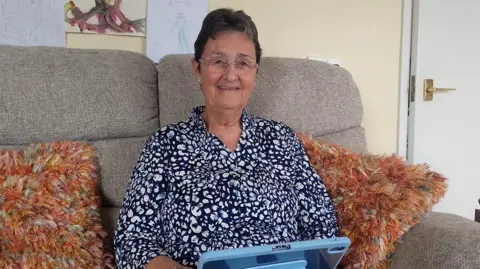Money-back operations 'brilliant' but can everyone afford them?
 BBC
BBCA woman who had her knee replaced privately in Poland two years ago said a new scheme aimed at reducing waiting lists is "brilliant" but she has concerns not everyone will be able to afford it.
Under the scheme, people who have been on an NHS waiting list for more than two years will now be able to pay for procedures in the Republic of Ireland and claim money back.
The £10m cross-border plan came into effect on Monday morning.
Christine Wallace, 73, from Donaghadee, who had knee surgery in Poland, said for people "able to afford to put the money up front it is fabulous".
"The difference it makes to your life when you get a knee replaced, a hip replaced – for me it was knee - I just got my life back, it was absolutely fabulous," she added.
"But I just worry about people that aren't going to be able to afford to put that kind of money up front, because it's a lot of money."
Ms Wallace said she paid about £9,000 two years ago including her flights.
"Even if one person gets a new knee, to me that's one person out of pain," she said.
"I really am glad that [Health Minister] Mike Nesbitt has been able to bring this forward and get it over the line.
"I just hope people take advantage of it... it's a brilliant scheme, I just think it's maybe not been thought out so that it benefits everybody."
 Getty Images
Getty ImagesExtension to rest of EU
The Department of Health (DoH) said that, in future, patients would be able to claim back money for operations in the rest of the EU.
But a date has yet to be set for when that extension will happen, and the number of patients able to avail of it will depend on how much money is left from the cross-border scheme.
"The second phase of the scheme – extension to the rest of the EU – will go ahead," a DoH spokesperson said.
"The scale of available funding will clearly be connected to take-up levels for the first phase."
Pay rises for healthcare workers
 Getty Images
Getty ImagesThe department is already facing a £600m deficit in its budget as it struggles to reduce waiting lists and fund pay increases for healthcare workers.
The reimbursement scheme was one of several initiatives Health Minister Mike Nesbitt announced to tackle waiting lists for planned operations, which are the highest in the UK.
The cross-border element of the scheme means patients will get back the amount of money the operation would have cost in Northern Ireland, subject to approval.
When it was launched last month, the department said full details of the plan were yet to be outlined and the full range of eligible procedures covered by the cross-border scheme was not known.
How will the scheme work?
Those eligible for the scheme will be able to access a health and social care online information hub giving guidance to patients on how to apply, eligibility criteria and access to the application form.
A previous scheme – the Republic of Ireland Reimbursement Scheme (RoIRS) - was introduced in June 2021 and ran for 15 months until funding was exhausted.
A total of 3,275 patients benefited at a cost of £21.45m, with patients able to seek, and pay for, routinely commissioned treatment in the private sector in the Republic and have the cost reimbursed.
The new reimbursement scheme was included in a plan outlining how £215m was to be used to tackle Northern Ireland's spiralling hospital waiting lists.
Of that, there will be £85m for red flag and critical care, £80m for building up capacity within the system, and up to £50m to start tackling the backlog in care.
The plan is to clear the four-year waits for more than 3,000 patients on lists for hip, knee, hernia and colonoscopy procedures.
There will be mega clinics for an estimated 20,000 patients waiting for ophthalmology, orthopaedics, general surgery and ear, nose and throat (ENT) operations.
Waiting lists for gynae mesh, children's squints, children's feeding tubes and cleft lip will also be tackled.
The department said there will also be a boost in the number of urology specialist nurses and an expansion of rapid diagnosis centres for quicker detection of pancreatic cancer.
